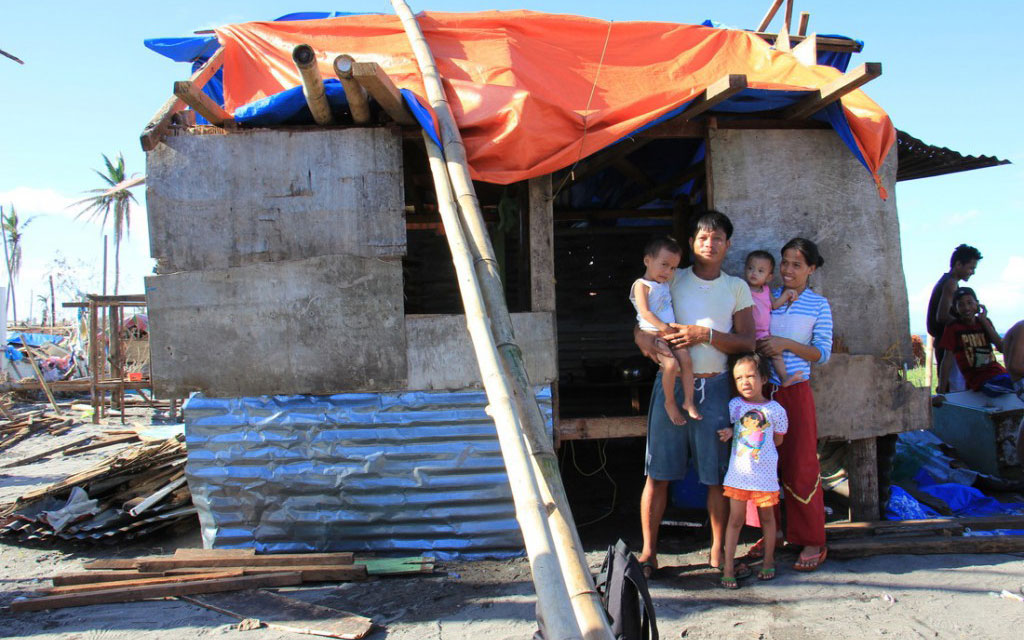Typhoon recovery: Understanding the difference between hard work and hard luck
 Narciso Pahayahay, 38, and his wife Maryann, 23—with their children Nicojena, 5, Nico, 3, and Jonhnico, 1—pictured outside their makeshift home. Pahayahay worked as a fisherman until Typhoon Haiyan destroyed his boat. Although their home was destroyed, with hard work, Pahayahay was able to fashion a shelter for his family. Without a boat, however—or materials to build one—he has no means of earning a living. Photo: Anne Wright/Oxfam
Narciso Pahayahay, 38, and his wife Maryann, 23—with their children Nicojena, 5, Nico, 3, and Jonhnico, 1—pictured outside their makeshift home. Pahayahay worked as a fisherman until Typhoon Haiyan destroyed his boat. Although their home was destroyed, with hard work, Pahayahay was able to fashion a shelter for his family. Without a boat, however—or materials to build one—he has no means of earning a living. Photo: Anne Wright/Oxfam
Jane Huber is creative director at Oxfam America.
Most people who lived in my father’s hometown in the 1930s wouldn’t eat squirrel; it was unfamiliar to them as food. But poor folks who had migrated up from “down South” were happy to make a meal of it. So, as a boy, he traipsed door-to-door where transplanted southerners lived to sell off the squirrels he had trapped. My dad, his sister, and my grandparents lived in the back of his father’s shop in a mid-Atlantic coastal town during the Depression. Most of what they ate was food they picked, bartered, caught, shot, or trapped.
It is little surprise that all my childhood—well into my adult years—I trusted in my father’s abilities to provide. I believed in the transformative power of hard work and resourcefulness. And it’s true that my dad rarely met an obstacle that he could not overcome.
To this day, I resist the idea that there is anything that cannot be remedied by hard work. In this—though my childhood was far easier than my dad’s—I am his daughter. So, as the first-person accounts of Typhoon Haiyan’s destruction have come in over the past month, I’ve read them with a practiced eye. I know to look beneath the images of devastation for the strong women and men who can and will recover.
This afternoon, I read a transcript from a colleague who has been collecting first-person accounts on the island of Leyte. Before Haiyan, Leyte was home to a thriving fishing community—not so dissimilar from the small coastal town where my dad grew up. Now, there are no boats visible along the coastline of Leyte; Haiyan destroyed every wooden fishing boat. Many local families are now homeless, but it was the loss of those boats that took my breath away. Narciso Pahayahay, 38, is a fisherman who has already rebuilt a shack for his family, but he can’t start earning money again.

“Our house was washed away and my boat was destroyed. Everything has been damaged, including the tools we use to earn a living,” he says. “We just have to wait for assistance because we can’t fish until we have…nets, and wood so we can rebuild our boats.”
Rosendo Nalda Jnr, 64, who is chief of Barangay Canhiduk in Palo, said 15 farming families in his village have already migrated to Manila because they were afraid they would be unable to support their families in Palo anymore.
“The village has stocks of rice, but only for 30 days. After that,” he said “we don’t know what will happen.”
What took me years to understand was that the hard circumstances of my father’s childhood were lived beneath an unnamed canopy that sheltered him. He was able-bodied and smart—and he was a white man raised in the US with nearly unlimited access to opportunities. No matter how hard the people of the Philippines work, they cannot get ahead if they no longer have the means of earning a living.
In the first weeks after a hurricane or earthquake or typhoon, we all understand the immediate needs of those affected: water, tarps, food. It’s during the next phase—after the typhoon drops from the headlines—that we all have an opportunity to make a lasting difference in the lives of Filipinos. They need the opportunity—the resources—to rebuild and they need the opportunities that allow people like my father to overcome poverty. Hard work will only get survivors so far.
(And, for the record, I still believe in hard work. I just recognize how easy it is to overlook good luck.)
Oxfam is working with affected communities on Leyte to provide basic needs as well as to help them rebuild their livelihoods in the longer term. Donate now to support our efforts.